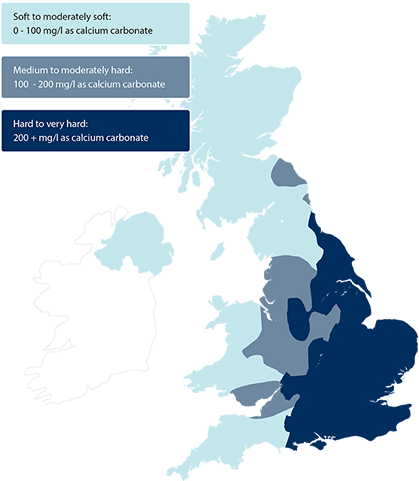Frequently Asked Questions
Have Your Questions Answered
1What Is Hard Water?
When it rains, the water falling from the clouds is completely soft, it is not until the rain hits the ground that it begins to absorb minerals such as calcium and magnesium found within the earth. These minerals, whilst natural, create scale build up causing hard water damage throughout your home.
2How Hard Is The Water In My Area?

3Can I Drink Softened Water?
4Why Do I Need To Put Salt In My TwinTec S3 Water Softener?
A water softener works by removing the magnesium and calcium present in your water supply through a process of ion exchange, turning it from hard water to softened water, this is done in the softeners two cylinders.
Both cylinders are filled with resin that traps the calcium and magnesium hardness minerals allowing only softened water to enter your home.
Harvey block salt is dissolved and the brine solution used to regenerate (clean) the resin tanks. This brine also provides the sodium needed to complete the exchange process during softening.
5How Much Will My TwinTec S3 Water Softener Take To Run?
Usage for a water Softener is difficult to predict, as every home is different, factors affecting it can be anything from the number of people living there, how hard the water coming into your home is, to whether you take a large bath or a quick shower everyday. However the TwinTec S3 Water Softener is the most efficient on the market and because its a metered system it will not regenerate unnecessarily.
The general rule we go by for usage, is that for every 1 person living in the home, you would use approximately 1 block of salt a month. So for example in a 2 person household would use 2 x 4kg blocks of salt a month.
2 x 4kg Blocks of Harvey Salt costs £5, therefore the running costs would be approximately £5 per month.
6Do Water Softeners Work With Combi Boilers & Pressurised Systems?
Yes, the TwinTec has a high flow rate and is designed to work effectively with both traditional and more modern, direct feed mains systems.
7Where Can I Have My Water Softener Installed?







